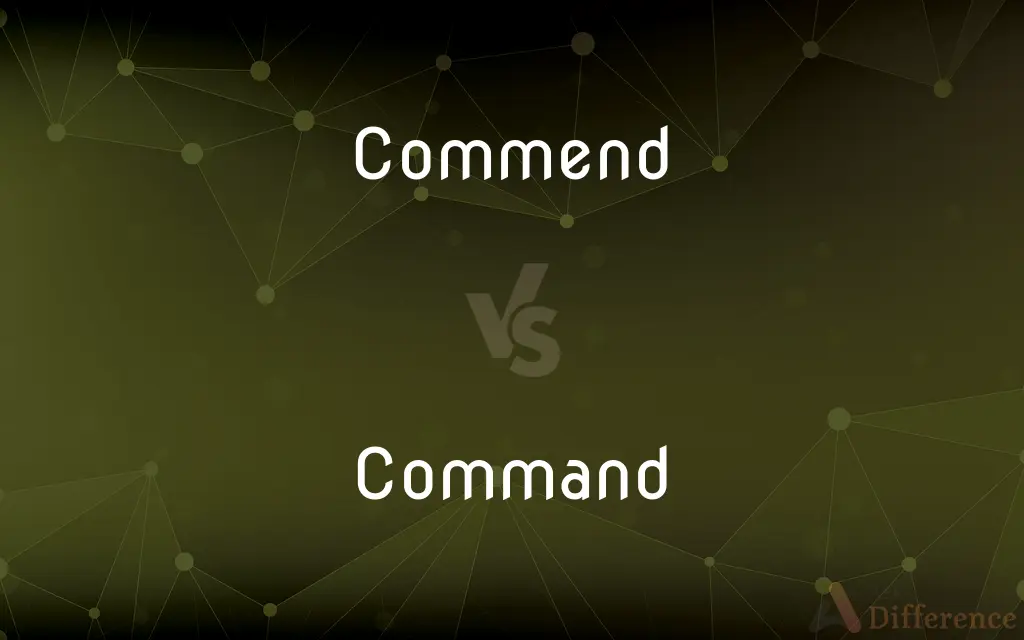Commend vs. Command — What's the Difference?
By Fiza Rafique & Urooj Arif — Updated on April 27, 2024
Commend refers to praising or approving someone, typically for their achievements or qualities, while command means to give an authoritative order or to have control over something.

Difference Between Commend and Command
Table of Contents
ADVERTISEMENT
Key Differences
Commend is used when expressing approval, praise, or admiration, often in an official or formal context, such as a commendation during a ceremony. Command, however, involves issuing an order or instruction with authority, implying a hierarchy or leadership role.
In terms of relationships, to commend someone usually reflects a positive, supportive interaction, focusing on acknowledging and uplifting others. On the other hand, to command often establishes a relationship where one party holds authority over the other, such as a military officer over their troops.
Commend can also imply a recommendation, where one advocates for a person or suggests something with confidence. Conversely, command can mean having mastery or superior skill in an area, such as an artist commanding a wide array of techniques.
While commendation is typically expressed through words or gestures that convey respect and admiration, commanding can manifest through directives, orders, or even control over resources and people.
Both verbs carry connotations of influence and impact, yet their methods and purposes diverge significantly: commendation seeks to uplift and celebrate, whereas commanding aims to direct or govern actions.
ADVERTISEMENT
Comparison Chart
Definition
To praise, express approval, or recommend.
To give orders, or exercise authority or control.
Relationship Type
Supportive and appreciative.
Hierarchical and authoritative.
Common Contexts
Ceremonies, reviews, recommendations.
Military, leadership roles, managerial contexts.
Secondary Meanings
To entrust someone or something for protection.
To have mastery or dominate in a particular area.
Connotations
Positive reinforcement, encouragement.
Authority, control, directive power.
Compare with Definitions
Commend
To express approval or praise formally or officially.
The general commended the soldier for bravery.
Command
Give an authoritative or peremptory order
‘Stop arguing!’ he commanded
My mother commands my presence
He commanded that work should cease
A gruff voice commanded us to enter
Commend
To present as worthy of confidence or notice.
I commend this book to anyone interested in history.
Command
Dominate (a strategic position) from a superior height
The fortress commands the shortest Channel crossing
Commend
Used in religious or formal contexts to entrust care.
We commend your spirit to the Almighty.
Command
Be in a strong enough position to have or secure
They command a majority in Parliament
He commanded considerable personal loyalty
Commend
To recommend or suggest.
The committee commended the new policy for early adoption.
Command
An authoritative order
He obeyed her commands without question
Commend
Often associated with awards and recognitions.
He was commended for his outstanding service.
Command
The ability to use or control something
He had a brilliant command of English
Commend
Praise formally or officially
He was commended by the judge for his courageous actions
Command
An instruction or signal causing a computer to perform one of its basic functions.
Commend
Present as suitable for approval or acceptance; recommend
I commend her to you without reservation
Command
To direct with authority; give orders to.
Commend
Entrust someone or something to
As they set out on their journey I commend them to your care
Command
To have control or authority over; rule
A general who commands an army.
Commend
To express approval of; praise
Commended the volunteers for their hard work.
Command
To have at one's disposal
A person who commands seven languages.
Commend
To represent as worthy, qualified, or desirable; recommend
I commend her book to you.
Command
To deserve and receive as due; exact
The troops' bravery commanded respect.
Commend
To cause to be worthy of recommendation
There is much about her book to commend it.
Command
To exercise dominating, authoritative influence over
"He commands any room he enters" (Stephen Schiff).
Commend
To commit to the care of another; entrust
Commended the orphans to the care of a guardian.
Command
To dominate by physical position; overlook
A mountain commanding the valley below.
Commend
(transitive) To congratulate or reward.
The schoolboy was commended for raising the alarm about the burning building.
Command
To give orders.
Commend
(transitive) To praise or acclaim.
Command
To exercise authority or control as or as if one is a commander.
Commend
(transitive) To entrust or commit to the care of someone else.
Command
The act of commanding.
Commend
(transitive) To mention by way of courtesy, implying remembrance and goodwill.
Command
An order given with authority.
Commend
(transitive) To recommend.
Command
(Computers) A signal that initiates an operation defined by an instruction.
Commend
To adorn; to set off.
Command
The authority to command
An admiral in command.
Commend
(obsolete) Commendation; praise.
Command
Possession and exercise of the authority to command
Command of the seas.
Commend
Compliments; greetings.
Command
Ability to control or use; mastery
Command of four languages.
Commend
To commit, intrust, or give in charge for care or preservation.
His eye commends the leading to his hand.
Father, into thy hands I commend my spirit.
Command
Dominance by location; extent of view.
Commend
To recommend as worthy of confidence or regard; to present as worthy of notice or favorable attention.
Among the objects of knowledge, two especially commend themselves to our contemplation.
I commend unto you Phebe our sister.
Command
The jurisdiction of a commander.
Commend
To mention with approbation; to praise; as, to commend a person or an act.
Historians commend Alexander for weeping when he read the actions of Achilles.
Command
A military unit, post, district, or region under the control of one officer.
Commend
To mention by way of courtesy, implying remembrance and good will.
Commend me to my brother.
Command
A unit of the US Air Force that is larger than an air force.
Commend
Commendation; praise.
Speak in his just commend.
Command
Of, relating to, or constituting a command
Command headquarters.
A command decision.
Commend
Compliments; greetings.
Hearty commends and much endeared love to you.
Command
Done or performed in response to a command
A command performance.
Commend
Express approval of
Command
An order to do something.
I was given a command to cease shooting.
Commend
Present as worthy of regard, kindness, or confidence;
His paintings commend him to the artistic world
Command
The right or authority to order, control or dispose of; the right to be obeyed or to compel obedience.
To have command of an army
Commend
Give to in charge;
I commend my children to you
Command
Power of control, direction or disposal; mastery.
He had command of the situation
England has long held command of the sea
A good command of language
Commend
Express a good opinion of
Command
A position of chief authority; a position involving the right or power to order or control.
General Smith was placed in command.
Commend
Mention as by way of greeting or to indicate friendship;
Remember me to your wife
Command
The act of commanding; exercise or authority of influence.
Command
(military) A body or troops, or any naval or military force, under the control of a particular officer; by extension, any object or body in someone's charge.
Command
Dominating situation; range or control or oversight; extent of view or outlook.
Command
(computing) A directive to a computer program acting as an interpreter of some kind, in order to perform a specific task.
Command
(baseball) The degree of control a pitcher has over his pitches.
He's got good command tonight.
Command
A command performance.
Command
(ambitransitive) To order, give orders; to compel or direct with authority.
The soldier was commanded to cease firing.
The king commanded his servant to bring him dinner.
Command
(ambitransitive) To have or exercise supreme power, control or authority over, especially military; to have under direction or control.
To command an army or a ship
Command
(transitive) To require with authority; to demand, order, enjoin.
He commanded silence
Command
(transitive) to dominate through ability, resources, position etc.; to overlook.
Bridges commanded by a fortified house. (Motley.)
Command
(transitive) To exact, compel or secure by influence; to deserve, claim.
A good magistrate commands the respect and affections of the people.
Justice commands the respect and affections of the people.
The best goods command the best price.
This job commands a salary of £30,000.
Command
(transitive) To hold, to control the use of.
The fort commanded the bay.
Command
To have a view, as from a superior position.
Command
(obsolete) To direct to come; to bestow.
Command
To order with authority; to lay injunction upon; to direct; to bid; to charge.
We are commanded to forgive our enemies, but you never read that we are commanded to forgive our friends.
Go to your mistress:Say, I command her come to me.
Command
To exercise direct authority over; to have control of; to have at one's disposal; to lead.
Monmouth commanded the English auxiliaries.
Such aid as I can spare you shall command.
Command
To have within a sphere of control, influence, access, or vision; to dominate by position; to guard; to overlook.
Bridges commanded by a fortified house.
Up to the eastern tower,Whose height commands as subject all the vale.
One side commands a view of the finest garden.
Command
To have power or influence of the nature of authority over; to obtain as if by ordering; to receive as a due; to challenge; to claim; as, justice commands the respect and affections of the people; the best goods command the best price.
'Tis not in mortals to command success.
Command
To direct to come; to bestow.
I will command my blessing upon you.
Command
To have or to exercise direct authority; to govern; to sway; to influence; to give an order or orders.
And reigned, commanding in his monarchy.
For the king had so commanded concerning [Haman].
Command
To have a view, as from a superior position.
Far and wide his eye commands.
Command
An authoritative order requiring obedience; a mandate; an injunction.
Awaiting what command their mighty chiefHad to impose.
Command
The possession or exercise of authority.
Command and force may often create, but can never cure, an aversion.
Command
Authority; power or right of control; leadership; as, the forces under his command.
Command
Power to dominate, command, or overlook by means of position; scope of vision; survey.
The steepy standWhich overlooks the vale with wide command.
Command
Control; power over something; sway; influence; as, to have command over one's temper or voice; the fort has command of the bridge.
He assumed an absolute command over his readers.
Command
A body of troops, or any naval or military force or post, or the whole territory under the authority or control of a particular officer.
Command
An authoritative direction or instruction to do something
Command
A military unit or region under the control of a single officer
Command
The power or authority to command;
An admiral in command
Command
Availability for use;
The materials at the command of the potters grew
Command
A position of highest authority;
The corporation has just undergone a change in command
Command
Great skillfulness and knowledge of some subject or activity;
A good command of French
Command
(computer science) a line of code written as part of a computer program
Command
Be in command of;
The general commanded a huge army
Command
Make someone do something
Command
Demand as one's due;
This speaker commands a high fee
The author commands a fair hearing from his readers
Command
Look down on;
The villa dominates the town
Command
Exercise authoritative control or power over;
Control the budget
Command the military forces
Command
To give an authoritative order.
The captain commanded his crew to prepare for departure.
Command
To have control over a group or situation.
She commands a team of over fifty employees.
Command
To demand as one's due or property; assert one's right or title to.
He commands the respect of his peers.
Command
To dominate a place or group through ability.
The veteran player commands the field with ease.
Command
To have a good grasp or mastery over a subject.
She commands six languages fluently.
Common Curiosities
Is commanding always about giving orders?
Primarily, yes, but it can also imply leading, controlling, or excelling in an area or skill.
What kind of actions might be commended in a community service context?
Actions such as volunteerism, exceptional service, or leadership in community projects are typically commended in community service contexts.
What does it mean to commend someone at work?
To commend someone at work means to formally recognize and praise their achievements or qualities, often during reviews or in team meetings.
How often is commend used compared to command in everyday language?
Command is more frequently used, especially in contexts involving authority or control, whereas commend is more specific to contexts of praise and approval.
How does a military command differ from a business command?
A military command involves strict, authoritative orders within a structured hierarchy, while a business command can be more about leadership and direction within a team or company.
Can commendations affect career advancement?
Yes, commendations can positively impact career advancement by highlighting an individual's capabilities and achievements to superiors and peers.
What is the significance of commendation in a professional setting?
In a professional setting, commendation serves to motivate, recognize, and validate an individual's efforts, contributing to a positive workplace culture.
Can command involve non-verbal communication?
Yes, command can involve non-verbal cues such as gestures or presence that assert authority or influence over others.
Does command imply respect?
Command implies respect insofar as it involves authority; however, true respect often depends on how the command is exercised.
Can commendation influence behavior?
Yes, commendation can serve as positive reinforcement, motivating individuals to continue their positive actions or behaviors.
Share Your Discovery

Previous Comparison
Exclusivity vs. Exclusiveness
Next Comparison
Stylised vs. StylizedAuthor Spotlight
Written by
Fiza RafiqueFiza Rafique is a skilled content writer at AskDifference.com, where she meticulously refines and enhances written pieces. Drawing from her vast editorial expertise, Fiza ensures clarity, accuracy, and precision in every article. Passionate about language, she continually seeks to elevate the quality of content for readers worldwide.
Co-written by
Urooj ArifUrooj is a skilled content writer at Ask Difference, known for her exceptional ability to simplify complex topics into engaging and informative content. With a passion for research and a flair for clear, concise writing, she consistently delivers articles that resonate with our diverse audience.














































